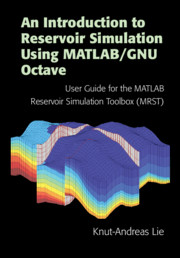 An Introduction to Reservoir Simulation Using MATLAB/GNU Octave
An Introduction to Reservoir Simulation Using MATLAB/GNU Octave Book contents
- Frontmatter
- Contents
- Preface
- 1 Introduction
- Part I Geological Models and Grids
- Part II Single-Phase Flow
- 4 Mathematical Models for Single-Phase Flow
- 5 Incompressible Solvers for Single-Phase Flow
- 6 Consistent Discretizations on Polyhedral Grids
- 7 Compressible Flow and Rapid Prototyping
- Part III Multiphase Flow
- Part IV Reservoir Engineering Workflows
- Appendix The MATLAB Reservoir Simulation Toolbox
- References
- Index
- Index
7 - Compressible Flow and Rapid Prototyping
from Part II - Single-Phase Flow
Published online by Cambridge University Press: 22 July 2019
- Frontmatter
- Contents
- Preface
- 1 Introduction
- Part I Geological Models and Grids
- Part II Single-Phase Flow
- 4 Mathematical Models for Single-Phase Flow
- 5 Incompressible Solvers for Single-Phase Flow
- 6 Consistent Discretizations on Polyhedral Grids
- 7 Compressible Flow and Rapid Prototyping
- Part III Multiphase Flow
- Part IV Reservoir Engineering Workflows
- Appendix The MATLAB Reservoir Simulation Toolbox
- References
- Index
- Index
Summary
This chapter explains how you can discretize the basic equations for single-phase, compressible flow by use of the discrete differential and averaging operators introduced in Chapter 4. These operators enable you to implement the flow equations in a compact form similar to the continuous mathematical description. By using automatic differentiation, you can automatically linearize and assemble the corresponding linear system without having to explicitly derive and implement expressions for partial derivatives in the Jacobian matrix. The combination of discrete operators and automatic differentiation with a flexible grid structure, a highly vectorized and interactive scripting language, and a powerful graphical environment, is the main reason MRST has proven to be an efficient tool for developing new proof-of-concept codes. To demonstrate this, we first develop a compact solver for compressible flow, and then extend the basic single-phase model to include pressure-dependent viscosity, non-Newton fluid behavior, and temperature effects.
Keywords
Information
- Type
- Chapter
- Information
- An Introduction to Reservoir Simulation Using MATLAB/GNU OctaveUser Guide for the MATLAB Reservoir Simulation Toolbox (MRST), pp. 202 - 228Publisher: Cambridge University PressPrint publication year: 2019
- Creative Commons
- This content is Open Access and distributed under the terms of the Creative Commons Attribution licence CC-BY-NC-ND 4.0 https://creativecommons.org/cclicenses/